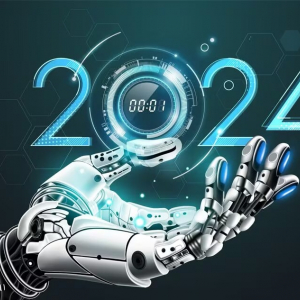CONTACT US
info@bidaiondo.com

The year in which we will move from 'ChatGPT for everything' to sectoralized artificial intelligencea

The fusion between social networks and 'ecommerce' will gain strength due to pressure from Chinese players like Shein or Temu and more emphasis will be placed on sustainability when creating technological products
In nothing there is more consensus among specialists than in this: If in 2023, ChatGPT captured the world's attention, 2024 will be the year of the explosion of generative AI, which promises to spread like an oil spill across a large number of sectors such as education , finance, health or commerce. “Everywhere I look I hear GenAI [generative artificial intelligence]. I’m at a conference in India right now and it’s all GenAI,” says Kiron Ravindran. This professor, along with five other colleagues from the IE Business School, collaborate again with CincoDías to find out what technological trends will mark 2024. A year in which we will have to be attentive to some regulations, including those of AI, or the arrival of Wifi 7 and Apple's extended reality glasses.
Generative AI
From the fight between ChatGPT, Gemini, Bard, Llama, Bedrock, the integration of these generative AI technologies for specific sectors (banking, insurance, retail, industrial, and a long etcetera) will continue to develop, with the fundamental objective of cost reduction. This is predicted by Fernando Aparicio, who advances that the adaptation of these technologies to current jobs will occur, in principle, as a clear productivity tool (improvements in demand forecasting, optimization and personalization of the user experience, performance of advertising campaigns, etc.).
Enrique Dans also believes that 2024 will be a year of strong consolidation of AI in all its aspects: “If generative AI helped many companies wake up to its possibilities and also its limitations in 2023, 2024 will be the year in that many other companies that do not clearly see use cases for a technology that gives rise to so many uncertainties, experiment with machine learning as a way of seeking more versatile and sophisticated automation.” There will be, he continues in line with Aparicio, a strong push for specialized algorithms, trained with data from specific areas: “If in 2023 we basically use ChatGPT for everything, in 2024 we will see many companies developing their own algorithms or adapting their training with their own data , either out of fear of the privacy of that data or out of the need to look for more specific and better trained applications in specific areas.”
This professor adds that, in addition to AI as such, there will be a strong boost to robotics: “The Optimus robot manufactured by Tesla will give rise to a strong reflection on what robots can do, and if generative AI became “A perceived threat to many so-called white-collar workers, its combination with robotics will lead to even more intense concerns about the future of blue-collar jobs.”
Casimiro Juanes and Eduardo Pedreño also predict an explosion in the adoption of AI, “by far the technology perceived as having the greatest potential,” says the former. “The rapid positioning of the magnificent seven (Apple, Alphabet, Microsoft, Meta, Tesla and Nvidia) around the new wave of AI says it all,” adds the second. But they issue some warnings, such as the risks associated with this technology such as deepfakes and misinformation and the need to have a good balance of “cost (energy/resources) versus use” with AI, since I have already heard several times that it is like bringing a pizza home in a Lamborghini,” says Juanes.
For this professor, it will be crucial to promote responsible and ethical use of this technology to foster greater trust in AI applications. And Pedreño suggests that, despite the disruption posed by AI, its pace of adoption will not be so fast because it does not yet offer the degree of reliability required to incorporate it into many business processes. “In many processes a success rate of 95% is acceptable, in others a reliability of 99.99% is required. Now we are in the first scenario and getting to the second can take time, sometimes a long time. Tesla's full self-driving is a good example, it is postponed year after year because it requires a very high degree of reliability,” he says.
Social ‘Ecommerce’
The fusion of social networks and ecommerce will accelerate, mainly due to the pressure from Chinese players (Shein, Temu, Miravia) that will force Amazon to take firmer steps in community development, gamification, live streaming, which is its pending subject and its main difference in terms of value proposition. We will see if it can achieve this while the impact of influencer marketing on digital marketing budgets will continue to grow as a way for brands to escape the growing market share of marketplaces.
Also linked to electronic commerce, Aparicio is committed to growth in the so-called quick commerce: “Glovo and Uber Eats are the counterpoint to the consumer looking for price, focusing on ultra-fast delivery, very much to the taste of the consumer looking for convenience, becoming, therefore , in a thriving channel for both marketing and sales, by working in distributor mode with the brands.”
More circular economy
The circular economy in innovation is Professor Zherui Yang's big bet for this year. In his opinion, “more sustainable use of resources will be made with the aim of redefining growth, focusing on positive benefits for all of society by decoupling economic activity from the consumption of finite resources.” This will involve, he says, eliminating waste from the system and transitioning to renewable energy sources. As he explains, more emphasis will be placed on creating technological products that are durable, easily repairable and upgradeable, reducing the need for frequent replacements and minimizing waste. Likewise, advanced recycling technologies will be used to recover valuable materials from electronic waste, promoting a closed-loop system in technology manufacturing. And there will be a shift towards service-based models (such as leasing or platform sharing) in technology sectors, promoting the efficient use of resources and extending the life cycle of products.”
and monetary investment in bitcoin and ethereum "only strengthens the trend, giving rise to more savers who prefer to see this type of assets guarded by a relevant actor in the financial environment." On the other hand, Pedreño and Juanes believe that cryptocurrencies are on the decline and are being relegated to a minority niche, “burdened by the worst management of a promising technology that is remembered, successive rebrandings that are more regrettable and unfulfilled promises at the expense of populism. They will once again generate bubbles and break promises, and the bankruptcies and imprisonments of the brilliant gurus of the phenomenon will continue,” says the first.
'Blockchain' and Web3
Dans is convinced that the blockchain will increasingly become the protocol on which more and more activities take place. “Web3, in which trust becomes embedded in the system protocol, will become increasingly predominant, and during 2024 we will see some large companies offering services in this environment and contributing to its popularization.” Faced with this opinion, Pedreño believes that blockchain technology continues to improve, “but there are very few use cases of notable implementation success and it has taken a back seat in the plans of many companies.” Along the same lines, Juanes assures that the blockchain continues to have a lot of potential for transformation, but that web 3.0 is “in a downward moment.”
‘No code/Low code’
Artificial intelligence is already used by 80% of developers to check and improve their code. “Are we facing the death of developers?” asks Juanes, who assures “that it would have a brutal impact, since many of the employment automation scenarios assume that what is destroyed on the one hand (automatable tasks) is increased by the other (developers who create the technology). And he points out an idea connected to this: the opportunity of No code/Low code, which helps change the perspective. "In many cases you don't need to be an expert in code, but you do it becomes more important to know how to talk better to the machine (so that it does it for you)." Kiron Ravidran is also convinced that no-code/low-code applications, "whether to create a process map or to develop applications, will continue growing".
https://cincodias.elpais.com/companias/2024-01-02/el-ano-en-que-se-pasara-del-chatgpt-para-todo-a-la-inteligencia-artificial-sectorializada.html
Last news
VIKO acquires Socialmood: a strategic boost for creativity in digital marketing

Bizum and European banks form an alliance to make cross-border mobile payments a reality.

online trading systems.
 We show you the best way to market products and services online, through a professional service of installation, management and maintenance of your virtual store
We show you the best way to market products and services online, through a professional service of installation, management and maintenance of your virtual store
We program to suit you
 We help you achieve operational excellence in all your business processes, whether they are production, logistics, service or office processes. In addition, we assure you to maintain continuous improvement in your management.
We help you achieve operational excellence in all your business processes, whether they are production, logistics, service or office processes. In addition, we assure you to maintain continuous improvement in your management.
Bidaiondo Articles
What is the best time to post on Facebook (2025)

Knowing the best time to post on Facebook will make a big difference in the reach and engagement of your posts. Although there's no magic formula, understanding user habits and taking advantage of the key moments when they're most active will be very useful in boosting your strategy on Meta's social network. What are the best times and days to post on Facebook? Looking at the engagement map for this social network, we discover that mo...
You'll never need a password to log into Facebook again. Get ready to use passkeys.

123456, 1245, 1111, 0000, password… These are some of the most common passwords in the world (and therefore some of the most insecure). You've probably used them at some point, whether to activate your phone, access your email, or log into your social media account. Maybe even Facebook. However, in recent years, we've seen signs that the era of traditional passwords is coming to an end, and the social network with the most users in...

ABOUT US
FILES

Welcome to Bidaiondo, dear user
BIDAIONDO SL, as the party responsible for the website www.bidaiondo.com, uses its own operating cookies and those of third parties of an analytical nature to allow the use of the website, analyze our services and show you information related to your preferences based on a profile drawn up from of your browsing habits (for example: pages visited). Please bear in mind that, if you do not activate some types of cookies, such as operational and analytical cookies, your experience of using this website may be affected. You can obtain more information and configure your preferences in the CONFIGURE option that appears below, you can reject cookies in the REJECT AND CLOSE option or accept all cookies and continue browsing in the ACCEPT AND CLOSE option.
So do you want to know more?
Data privacy seems important to you, and it is to us too. We store cookie data for 13 months. If you want to know more, you can visit our pages Privacy Policy y Cookies policy. Do you know what cookies are? Cookies are files that are used by virtually all websites. When browsing our page, they are installed in your browser or device to ensure that the website works correctly and store information about your visit. The data provided by cookies treat the user anonymously and in no case do they store personal information.
The data collected by the cookies we use are:
- Addresses IP
- References of visited pages
- References of downloaded files
- The website itself www.bidaiondo.com
- https://www.moz.com
- https://secure/europeanssl.eu

 Spanish
Spanish













